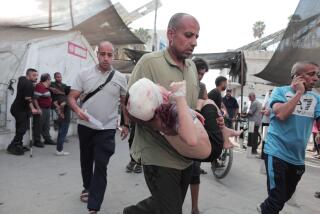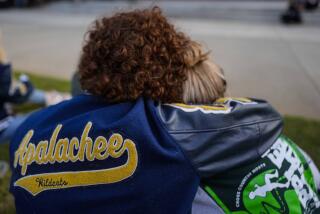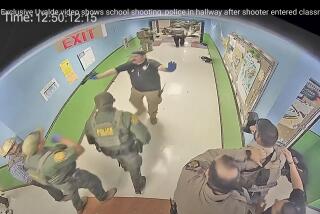A battlefield called school
BAGHDAD — Iraq’s schools, long touted by American officials as a success story in a land short on successes, increasingly are being caught in the crossfire of the country’s escalating civil war.
President Bush has routinely talked about the refurbishment and construction of schools as a neglected story of progress in Iraq. The U.S. Agency for International Development has spent about $100 million on Iraq’s education system and cites the rehabilitation of 2,962 school buildings as a signal accomplishment.
But today, across the country, campuses are being shuttered, students and teachers driven from their classrooms and parents left to worry that a generation of traumatized children will go without education.
Teachers tell of students kidnapped on their way to school, mortar rounds landing on or near campuses and educators shot in front of children.
This month insurgents distributed pamphlets at campuses, some sealed inside an envelope with an AK-47 bullet.
“To the Honest People of Baghdad,” one pamphlet read, “we want you to leave the schools, hospitals, institutes, colleges and universities until the illegal government of [Iraqi Prime Minister Nouri] Maliki is put down. We want your full cooperation on this.”
No credible current national school attendance statistics exist in Iraq, whose education system was once considered a model in the Arab world. But examples abound of schools being closed or left mostly empty as parents flee the country or keep their children home.
Suaad Ahmed, 35, a resident of the capital’s Mansour district, ran to her son’s school when she heard gunfire thundering near her house. She arrived to see rival groups of gunmen firing through the schoolyard and children screaming.
“They used the garden as a battleground,” Ahmed said. “They were hiding behind trees for protection and shooting.”
Her kindergartner and the other children were safe -- this time. But the school was closed for weeks afterward.
Baghdad’s schools appear to have been most affected by the violence, but campuses have also been shut down for months at a time in Al Anbar and Diyala provinces. On Monday, gunmen in Dujayl, 40 miles north of the capital, abducted five elementary school teachers as they commuted to work. Schools there were closed indefinitely.
Education Minister Khudair Khuzai denied that schools were being targeted, saying they were victims of Iraq’s chaotic environment.
“Incidents where students and teachers are involved in violence result from indirect attacks,” he said. “For example, a student would be kidnapped for ransom -- this is in no way related to the school itself but is more of a family matter.”
But the scale of the violence is such that public places -- squares, gas station lines, open-air markets and schools -- have become killing zones
Education Ministry officials have done little to secure Baghdad’s schools. Officials said that school guards are not allowed to carry arms, and in at least one case, a guard was slain by gunmen.
At one elementary school in Mansour, a neighborhood of large homes once known for good schools and relatively little violence, the principal scoffed at an unarmed guard the ministry had dispatched after the campus was threatened.
“What is he going to do? We even started to make jokes about him,” said the principal, who spoke on condition her name not be used. “When a gang of armed men come, he will start screaming: ‘Here’s the principal! Kill her!’ ”
The principal, a woman in her early 30s, said she had started bringing a revolver to work. “I cannot risk being kidnapped,” she said apologetically.
When the school year began this fall, six students showed up, she said. But attendance gradually picked up. Then the principal received a series of anonymous threats on her cellphone.
“A man said we should close the school, otherwise they will come and bring the school down on our heads,” she said.
She took the threat seriously. Two months ago, a friend who was a principal at another school in Mansour was shot to death on his way home. Last school year, two students at her school were kidnapped and held for ransom for weeks. Shiite and Sunni Arab fighters have battled recently on Mansour’s streets, and a rash of assassinations has swept the neighborhood.
The principal asked the ministry for help, but kept the school open. After a few days, the anonymous man called again.
“Ah, you are still opening the school,” said the man. “Why haven’t you closed it? I’ve already killed men with big mustaches, so what of you? You’re just a woman.”
After that, the principal shut the school for a time, the first of a series of closures. Now, only 150 out of 420 students attend. The principal worries that she will have to stop classes for good. Last week, gunmen killed two men who were sitting in a car next to the school, she said.
The violence has affected some of the country’s most elite campuses. At Baghdad College Preparatory School, one of the country’s best-known high schools, hundreds of students have withdrawn this year -- 60 from teacher Hussein Khalifa’s classes alone.
The campus was closed Monday, Khalifa said, because of clashes between rival groups of gunmen.
“Two of my students have been kidnapped this year and then released because their parents paid ransom,” Khalifa said. Gunmen snatched one boy off a school bus last month. “I think the kids are used to this, because last year six of my students were kidnapped,” he said.
Khalifa said the turmoil was affecting the school work and aspirations of Baghdad’s best and brightest.
“They’ve got no hope or motivation,” he said. “If they graduate, so what? What will they do in this country where everyone is killing each other?”
Even those who make it to class often struggle through arithmetic and Arabic, haunted by memories of slain parents, abducted classmates and the crackle of gunfire outside, teachers say.
Maha Hamid, a teacher herself, pulled her two sons, Mustafa, 12, and Marwan, 10, out of school for three weeks while she searched for her husband, who was kidnapped from his grocery store last month and remains missing.
Hamid recently returned the boys to school and went back to her job teaching English and physical education. She hoped to show a brave face, especially for two studious girls in one of her classes whose fathers were killed two months ago.
But her heart wasn’t in it. “The kids were saying, ‘It’s a sunny day, please take us out for a sports lesson,’ ” she said. “But I was depressed, and I thought, what will people think? My husband was kidnapped and now she’s exercising the kids.”
Hamid used to be proud of her school. Now it’s full of empty seats and deserted classrooms, with 100 of its 700 students left.
“We have lost talented teachers. One woman taught first grade, but her son was killed, so she didn’t attend anymore,” Hamid said. “We don’t have a math teacher right now. We’re also missing history and geography teachers. We used to have four first-grade teachers, but all of them went to other cities or countries.”
This week, Hamid said she regretted sending her children back to school. “I had a neighbor drive them, but when they stepped out of the car, gunmen were in the street shooting randomly,” she said. “My sons ran out of the car and hid until the shooting was over.”
Mustafa Jafar, 10, lives in Baghdad’s Arbataash Tamuz neighborhood, where he often stays home because of the clashes between Shiite militiamen in Sadr City to the east and Sunnis in Adhamiya to the west.
With a serious demeanor that belied his youth, Jafar said the violence had driven many of his best friends and favorite teachers out of Baghdad.
“The last thing I was discussing with my friend Yunis Mahmoud was that his family was leaving to Syria,” he said. Syrian officials told the family that “Dec. 5 will be the last day of accepting Iraqi students, so this is a problem for them,” he said.
“There is also a female teacher who was threatened. Her brother was killed by the Americans, and her son is with me in the first grade. They are going to Kurdistan where it’s safer, so he will have to postpone his studies this year.”
When he does attend school, Jafar frets.
“I’m worried and afraid,” he said. “Once, the teachers found a bomb behind the school.”
More to Read
Sign up for Essential California
The most important California stories and recommendations in your inbox every morning.
You may occasionally receive promotional content from the Los Angeles Times.










